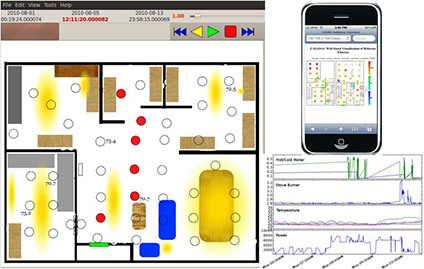August 2013
PULLMAN, Wash. – Washington State University researchers have received a National Science Foundation grant to share their “smart home in a box” technology with 60 institutions and scientists around the world in what will be the largest-ever installation of such home monitoring systems.
The collaborators will develop their own monitoring projects in a home or a lab and report back their results. With this data, the WSU researchers will be able to develop a system for using and sharing cutting-edge, smart environments data on a large scale.
“The data collection will offer unprecedented opportunities for researchers to study human health and behavior,’’ said Diane Cook, Huie-Rogers Chair professor in the WSU School of Electrical Engineering and Computer Science. “It will be a step toward the goal of scaling pervasive computing to larger population groups and settings.’’
Smart home research uses programmed sensors in the home to monitor, predict and ultimately improve quality of life, especially in care of the elderly.
As the U.S. population becomes older, using technology to address the challenges of aging is of increasing interest to everyone from elderly residents to care providers and government leaders. Allowing the elderly to stay in their homes not only keeps them happier but also saves money since assisted living costs can average $70,000 per year.
WSU researchers have already developed the non-intrusive “smart home in a box’’ that is able to monitor and learn residents’ normal daily activities in their apartments or houses. About the size of a printer, the system can monitor residents’ locations and activities, learn their routines, note when there is a change and prompt them if they forget to do something.
With the aim of maintaining privacy, the system is unlike some home monitoring systems in that it does not include cameras or microphones. Using state-of-the-art technology, the system is wireless, is easy to install and provides high-quality data.
WSU researchers are working to commercialize the technology. However, while there is a lot of interest and potential application for smart environments, the technology has not been available at the large scale.
The three-year, $900,000 grant will introduce researchers around the world to the WSU technology, create a large research database and improve communication among researchers in the field of smart environments.
The WSU team is working to develop the infrastructure for a large database that could someday include a whole community, rather than just individual homes. So, for instance, the researchers could learn a community’s behavior related to energy usage, and smart sensors could learn to react to the behavior.
“Ideas for developing smart environments and related technologies abound,’’ said Cook, “but due to the difficulty of creating a fully functional smart environment infrastructure, many of these ideas are discussed in theory or are tested on simulated data. In fact, because data is in such high demand for the field, researchers actually have designed complex simulators to provide an approximation of realistic conditions.’’
The WSU researchers will ship their smart home boxes to researchers around the world starting in September. They hope to deliver 20 systems by December.
Find this news release at WSU News online at http://bit.ly/13nOvXU
Contacts:
Diane Cook, Huie-Rogers Chair professor, WSU School of Electrical Engineering and Computer Science, 509-335-4985, djcook@wsu.edu.
Tina Hilding, communications coordinator, WSU College of Engineering and Architecture, 509-335-5095, thilding@wsu.edu
~~~~~~~~~~~~~~~~~~~~~~~~~~~~~~~~~~~~~~~~~~~~~~~~~~
WSU News
French Ad #446
Pullman, WA 99164-1040
509-335-3581, e-mail: wsunews@wsu.edu

